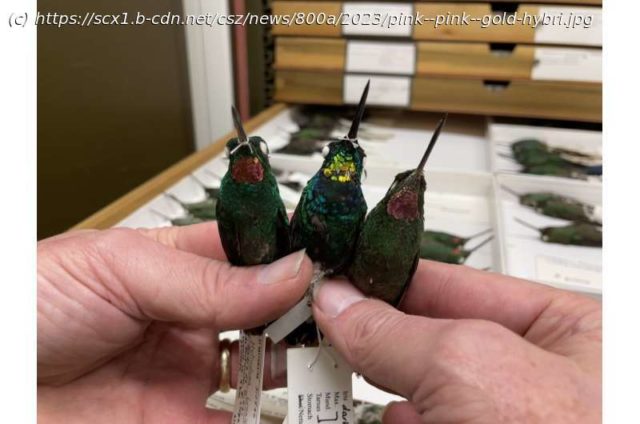The pink-throated brilliant hummingbird, Heliodoxa gularis, has, unsurprisingly, a brilliant pink throat. So does its cousin, the rufous-webbed brilliant hummingbird, Heliodoxa branickii. When scientists found a Heliodoxa hummingbird with a glittering gold throat, they thought they might have found a new species. However, DNA revealed a different story: The gold-throated bird was a never-before-documented hybrid of the two pink-throated species.
The pink-throated brilliant hummingbird, Heliodoxa gularis, has, unsurprisingly, a brilliant pink throat. So does its cousin, the rufous-webbed brilliant hummingbird, Heliodoxa branickii. When scientists found a Heliodoxa hummingbird with a glittering gold throat, they thought they might have found a new species. However, DNA revealed a different story: The gold-throated bird was a never-before-documented hybrid of the two pink-throated species.
John Bates, the senior author of a new study in the journal Royal Society Open Science reporting on the hybrid, first encountered the unusual bird while doing fieldwork in Peru’s Cordillera Azul National Park, which protects an outer ridge on the eastern slopes of Andes mountains. Since the area is isolated, it would make sense for a genetically distinct population to emerge there. « I looked at the bird and said to myself, ‘This thing doesn’t look like anything else.’ My first thought was, it was a new species, » says Bates, a curator of birds at Chicago’s Field Museum.
When Bates and colleagues gathered more data about the specimen in the Field Museum’s Pritzker DNA Lab, however, the results surprised everyone. « We thought it would be genetically distinct, but it matched Heliodoxa branickii in some markers, one of the pink-throated hummingbirds from that general area of Peru, » says Bates. If it was H. branickii, it didn’t make sense for the bird to have gold throat feathers; in the hummingbird family, it’s rare for members of the same species to have dramatically different throat colors.






